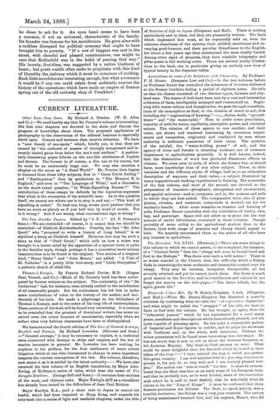CURRENT LITERATURE.
Other Suns than Ours. By Richard A. Proctor. (W. H. Allen and Co.)—We need hardly say that Mr. Proctor's volume is interesting. His first nine chapters are devoted to the stars, and discuss the progress of knowledge about them. The proposed application of photography to the observation of the sidereal heavens is especially dwelt upon. Comets and meteors then receive attention. We have a "new theory of sun-spots," which, briefly put, is that they are caused by "the outburst of masses of strongly compressed and in- tensely heated gases from below the sun's real surface." A particu- larly interesting paper follows on the sun-like attributes of Jupiter and Saturn. The former is, of course, a dim sun to his moons, but he must be an enormously large one. We may also mention a chapter on the moon as "A Dead World." Mr. Proctor then begins to descend from these lofty subjects, first to "Great Circle Sailing" and "Earthquakes," then by gradations to "The Misused H in England," and even to "The Language of Whist," and a discussion on the much-vexed question, "Is Whist-Signalling Honest ?" The introduction of these essays he defends by the ingenious argument that whist is the recreation of the scientific man. As to the question itself, we cannot see where one is to step in and say,—` This kind of signalling is unfair.' To lead ace, king, shows your partner that you have no more as plainly as if you told him by word of mouth. But is it wrong ? And if not wrong, what conventional sign is wrong ?


































 Previous page
Previous page